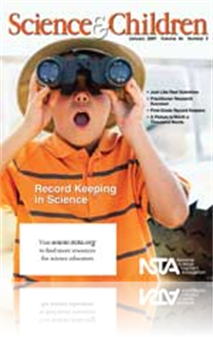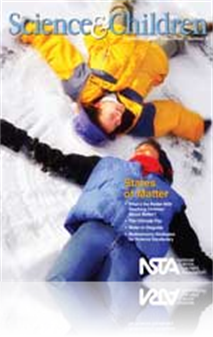All Science and Children resources
Journal Article
Science 101: How does a scientific theory become a scientific law?
A theory doesn’t become a law. End of story, end of this issue of Science 101. Just kidding—it’s all about the how and why, and that hasn’t been answered. See if this sounds familiar: Scientists begin with a hypothesis, which is sort of a gu...
Journal Article
Every Day Science: January 2009
This monthly feature contains facts and challenges for the science explorer. ...
Journal Article
Developing good record-keeping habits is essential for organizing, processing, and communicating experimental results objectively. Therefore, the authors designed an interactive method of teaching first graders to record, organize, and interpret data...
Journal Article
Teaching Through Trade Books: Communicating With Pictures and Precision
From the earliest civilizations, humans have used drawings and pictures as a form of communication and to convey information—whether it was the seasons or location of good hunting grounds. In this month’s column, simple alphabet picture books sho...
Journal Article
Multisensory Strategies for Science Vocabulary
Seeing, touching, smelling, hearing, and learning! The authors observed that their English Language Learner (ELL) students achieved a deeper understanding of the properties of matter, as well as enhanced vocabulary development, when they were guided ...
Journal Article
Many recipes for elementary science activities suggest making carbon dioxide from baking soda and vinegar; however, they often do not give exact measurements of the ingredients. The author was able to turn this “drawback” into a plus by challengi...
Journal Article
This article presents a lesson plan in which students learn about water in solid, liquid, and gaseous phases through trade books, demonstrations, and artwork. The author illustrates the stages of the lesson plan in the sequence they were conducted in...
Journal Article
Dinosaur Extinction, Early Childhood Style
Do dinosaurs have bellybuttons? This intriguing question launched a journey into inquiry science that captivated a class of four-year-olds for eight months. As students enjoyed dinosaur books, examined dinosaur artifacts, drew pictures, watched video...
Journal Article
Science 101: What causes the different states of matter?
The answer to this could be really simple or really complicated, depending on how deeply the issue is covered. Therefore, the author will dispense with the really complicated by limiting the discussion to solids, liquids, and gases. There are many ot...
Journal Article
Connecting Children to Their World
Planning effective, engaging lessons and units are challenging tasks for a teacher, but the process can also be meaningful and rewarding. Using a big understanding—a guiding statement describing essential content you want students to learn througho...




